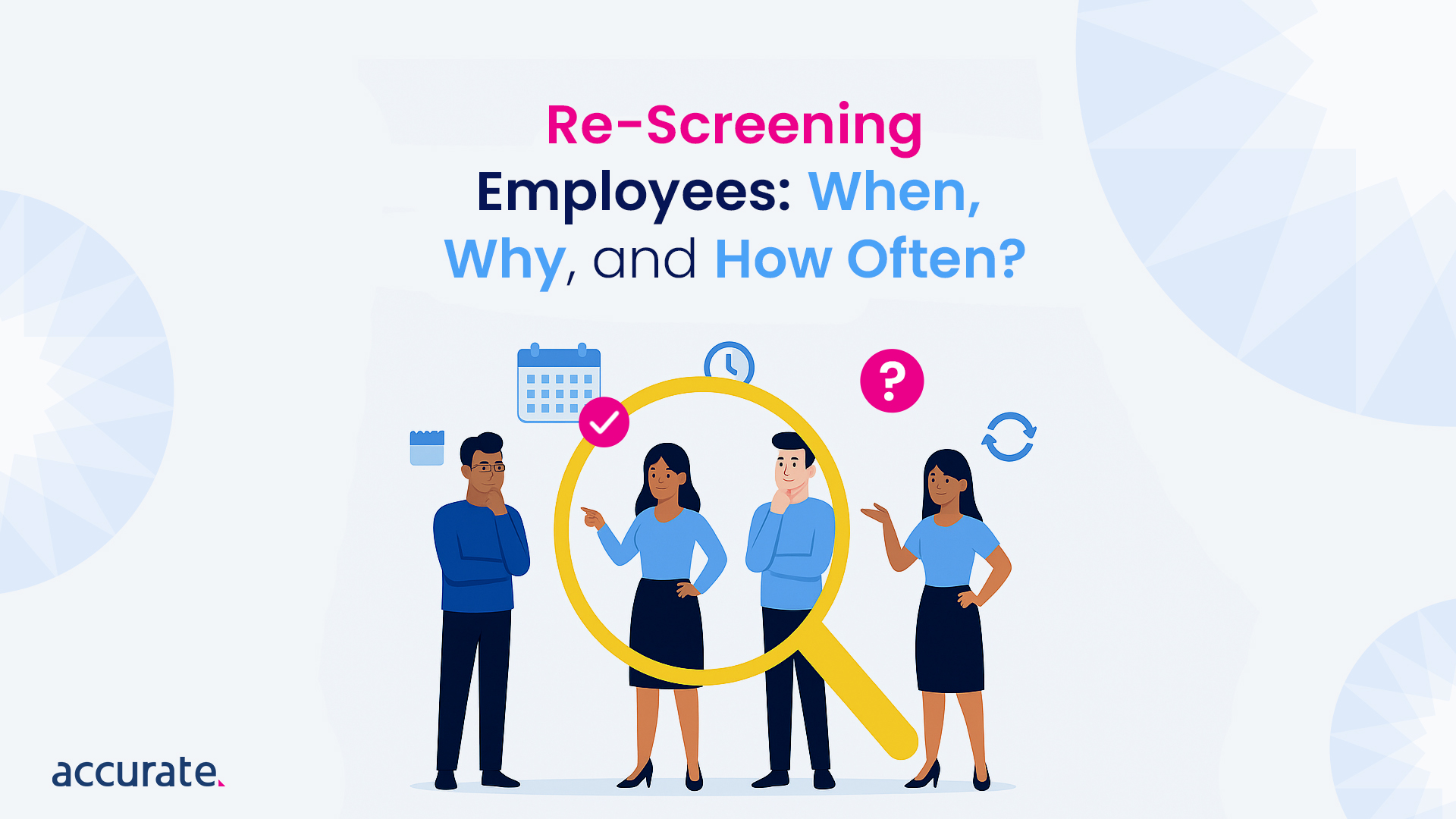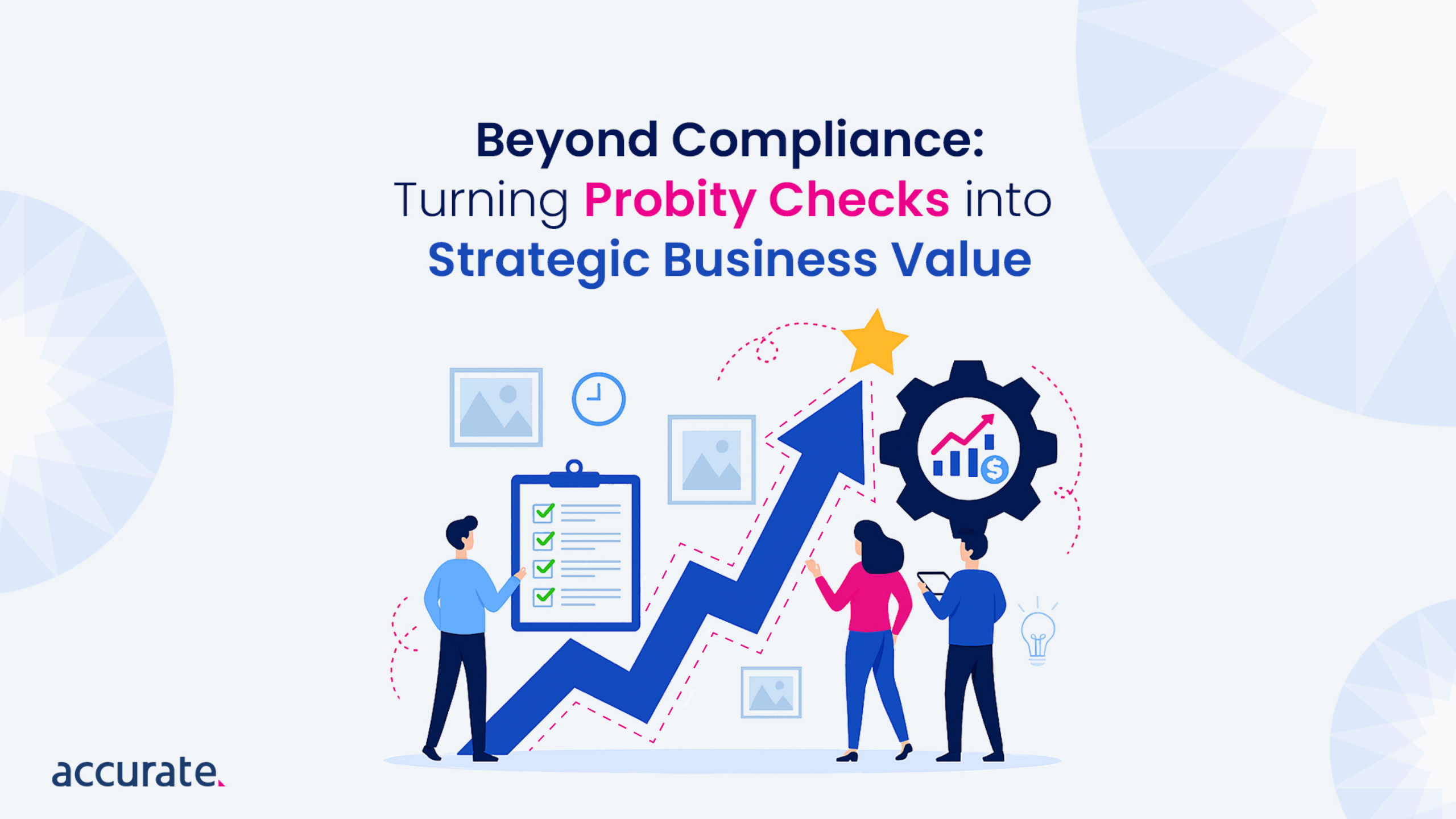Hiring the right people is only half the battle. What happens after someone joins the team matters just as much. An employee’s circumstances can change—licences expire, criminal records are acquired, and promotions or lateral moves can introduce new risks.
For Australian employers, ongoing employee re-screening isn’t just good practice; it’s increasingly a regulatory expectation and a critical safeguard against fraud, compliance breaches, and reputational harm.
What is Re-screening?
Re-screening refers to conducting periodic or event-triggered background checks on current employees and contractors. Unlike pre-employment screening, which provides a snapshot at the point of hire, re-screening ensures that workforce integrity is maintained throughout the employment lifecycle.
It’s about answering a simple question: What has changed since the employee joined? Re-screening can include criminal history checks, professional licence verifications, Working With Children Check renewals, and fit-and-proper assessments depending on the role and industry.
Why Re-screening Matters in Australia
Employee circumstances don’t stay static, and neither do regulatory requirements. Research shows that many fraud incidents involve internal employees, often discovered only after significant harm has occurred: According to a 2024 PwC survey, workplace insiders were linked to 57% of the worldwide losses to fraud over two years, amounting to $42 billion.
Re-screening provides an ongoing layer of due diligence that helps Australian organisations meet their legal obligations, protect vulnerable populations, and maintain stakeholder trust.
For sectors like finance, childcare, healthcare, and government, periodic checks are no longer optional—they’re embedded in required compliance frameworks.
Industries That Need Periodic Checks
Finance and Banking
Australian financial institutions face strict regulatory oversight from APRA and ASIC. Under APRA’s Prudential Standard CPS 520, regulated entities must assess whether responsible persons are fit and proper at the time of appointment and annually thereafter. ASIC’s fit-and-proper requirements apply to senior leaders, financial advisers, and key personnel.
AUSTRAC also requires employee due diligence as part of AML/CTF compliance. Many institutions conduct annual criminal history rechecks and declarations for staff in senior or high-risk roles.
Childcare and Education
Working With Children Checks (WWCCs) must be renewed every two to five years, depending on the state or territory.
In Victoria, WWCCs expire after five years and can be renewed online up to six months before expiry. In NSW, the same five-year renewal applies, costing $107 for paid workers and free for volunteers.
Employers are legally responsible for verifying the validity of WWCCs and ensuring that educators don’t work beyond their expiry date. Failing to renew on time is a criminal offence in most jurisdictions.
Healthcare and Aged Care
Healthcare workers registered with AHPRA are required to maintain current registration, which includes ongoing professional development and regular conduct checks.
NDIS Worker Screening Checks are valid for five years and involve continuous monitoring throughout that period. From 1 November 2025, all aged care workers and responsible persons must hold either a police certificate issued within the last three years or an NDIS worker screening clearance.
Government and Public Sector
Government agencies typically require security clearances and probity checks for employees in sensitive roles. These clearances often require periodic renewal and can be suspended or revoked if an individual’s circumstances change.
Public sector organisations commonly conduct annual declarations and event-based re-checks for roles with access to classified information or financial systems.
How Often is Re-screening Required?
Best practice recommends annual re-screening as a baseline for most risk-assessed roles. High-risk positions—such as those involving financial transactions, access to sensitive data, or unsupervised contact with vulnerable people—may warrant semi-annual checks.
AUSTRAC guidance suggests that re-screening frequency should be risk-based, with more frequent checks for higher-risk roles. Many organisations align their re-screening cadence with licence or registration renewal cycles to streamline compliance.
A Note on Event-Based Triggers
Certain events should automatically prompt re-screening, even if a periodic check isn’t yet due. These include promotions or role changes that grant elevated access to systems or data. For example, a bank employee promoted from a customer service role to a trading desk should undergo a fresh fit-and-proper assessment.
Other triggers include contractor renewals, regulatory updates, return from extended leave, mergers and acquisitions, and misconduct flags. Embedding these triggers into HR workflows ensures timely action.
Risks of Skipping Re-screening
Financial Loss and Fraud Exposure
Global fraud surveys show that a significant percentage of fraud incidents involve internal employees or collusion between staff and external parties. Without ongoing checks, organisations remain blind to changes in an employee’s financial circumstances, criminal history, or professional standing. This creates financial criminal opportunities for theft, embezzlement, and unauthorised access to funds or data.
Regulatory Non-Compliance and Penalties
Industries such as finance, childcare, and healthcare face steep penalties for failing to maintain up-to-date workforce screening records. APRA and ASIC can suspend or cancel licences if fit-and-proper requirements aren’t met.
Aged care providers face regulatory action and reputational damage for failing to comply with worker screening obligations. WWCC breaches can result in criminal charges.
Safety Incidents and Duty-of-Care Breaches
Failing to re-screen workers in roles involving vulnerable populations—such as children, people with disability, or older Australians—can lead to serious safety incidents. Employers have a duty of care to ensure that individuals in these roles remain suitable for their employment throughout.
Expired WWCCs, lapsed NDIS clearances, or undetected criminal convictions can expose organisations to significant legal and moral liability.
Reputational Harm and Stakeholder Trust Erosion
Public trust is hard-won and easily lost. A single high-profile incident involving an employee with an undisclosed criminal record or expired clearance can damage an organisation’s reputation for years. Stakeholders, including clients, regulators, investors, and the community, expect employers to maintain rigorous standards of workforce integrity.
Best-Practice Program Checklist
Australian employers should design re-screening programs that are fair, transparent, and compliant with relevant laws.
Here’s a practical checklist:
- Align with Australian law: Ensure policies comply with the Privacy Act 1988, Fair Work Act 2009, and Australian Standard AS 4811:2022 Workforce Screening.
- Obtain transparent consent: Clearly communicate when and why re-screening may occur, and obtain informed consent before conducting checks.
- Implement role-based risk tiers: Categorise roles by risk level and assign appropriate re-screening cadences—annual for standard roles, semi-annual for high-risk positions.
- Establish event-based triggers: Build automated workflows that flag promotions, role changes, contractor renewals, and other key events requiring re-screening.
- Integrate with HRIS and ATS: Use technology to track expiry dates, send renewal reminders, and maintain audit trails.
- Extend to vendors and contractors: Apply re-screening protocols to external workers and third-party providers with access to systems or vulnerable populations.
- Document governance and decision-making: Maintain clear records of re-screening decisions, outcomes, and actions taken.
- Review and improve regularly: Audit your re-screening program annually to ensure it remains effective, efficient, and aligned with evolving regulations.
How Accurate Australia Helps
Accurate Australia provides comprehensive employment screening and ongoing monitoring solutions designed for Australian employers.
From pre-employment checks to continuous re-screening, Accurate helps organisations build and maintain a trusted workforce. Services include criminal history checks, Working With Children Check tracking, NDIS Worker Screening Check verification, right-to-work monitoring, and reference checks.
Our platform integrates seamlessly with HRIS systems, automates renewal reminders, and makes it easier to stay compliant with Privacy Act and AS 4811:2022 requirements.
Speak with Accurate Australia today to build a re-screening program that’s compliant, efficient, and right for your organisation.
Key Takeaways
- Re-screening employees is no longer a nice-to-have—it’s a regulatory expectation and a core component of workforce risk management in Australia.
- By implementing a clear policy, aligning re-screening cadences with industry best practices, and leveraging technology to track compliance, Australian employers can protect their organisations, their people, and their reputation.
- Don’t wait for an incident to prompt action.



